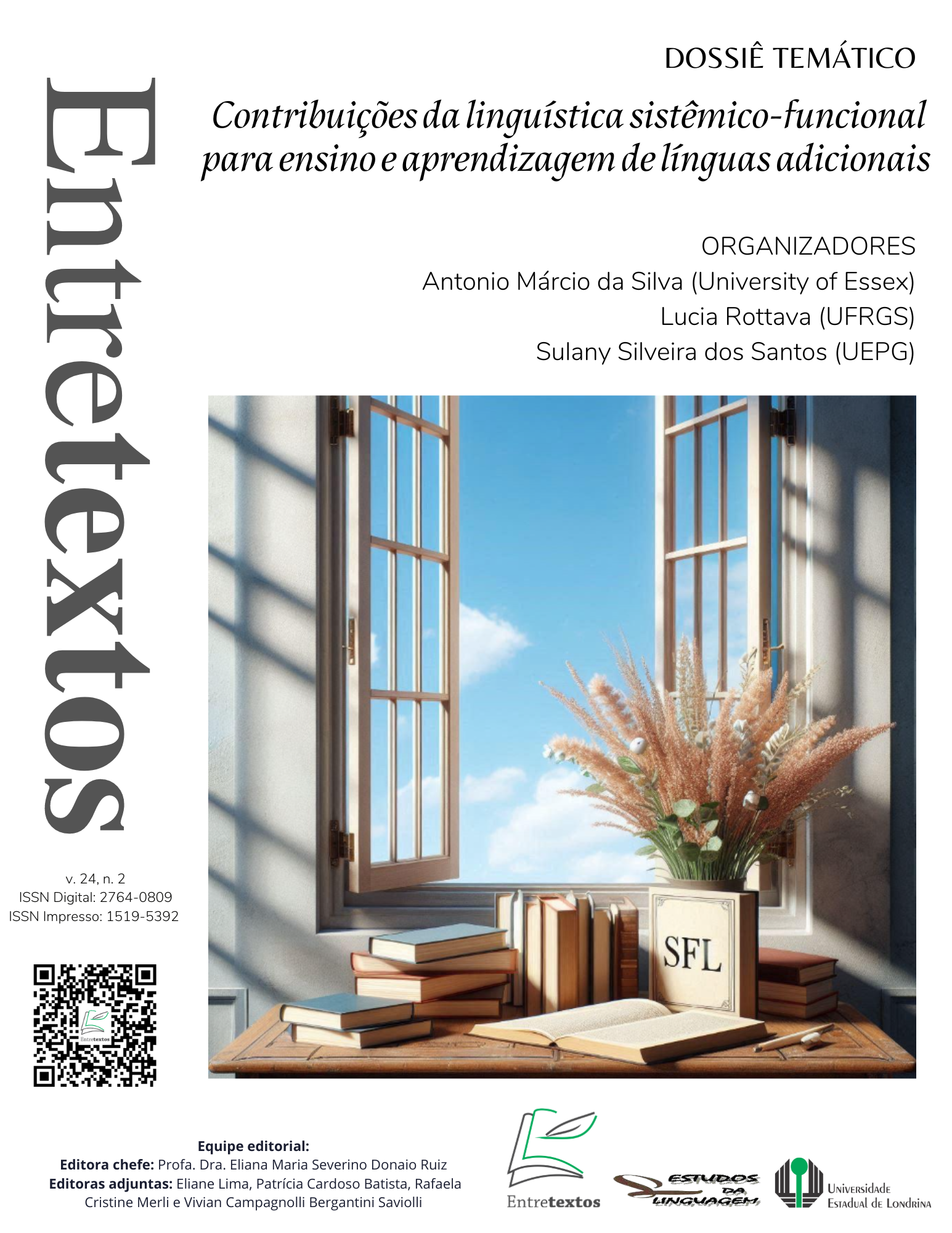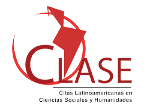O programa profissional de aprendizagem Ler para Aprender e a pedagogia baseada em gêneros no ensino e na aprendizagem de línguas adicionais
Palavras-chave:
Pedagogia com base em gêneros de texto, LSF, Gêneros do currículoResumo
Neste artigo descrevemos um macro procedimento para a sequência de gêneros do currículo, concebido na pedagogia baseada em gênero no Programa Ler para Aprender (LPA). A Linguística Sistêmico-Funcional (LSF) tem sido amplamente utilizada na análise, na educação de línguas e, também, no ensino e aprendizagem de línguas adicionais. Portanto, apresentaremos a aplicabilidade teórica e prática das contribuições da LSF e também da sociolinguística de Bernstein (2000) para o ensino e aprendizagem de línguas adicionais, com o intuito de que docentes possam aprimorar o ensino de leitura e de escrita em salas de aula através do uso do Ciclo de Ensino e Aprendizagem (CEA) e o ensino de gêneros nas escolas (Rose, 2016, 2018, 2020a, 2020b). Do ponto de vista metodológico, as atividades de ensino e aprendizagem são descritas com mais detalhes, destacando a interação professor/aluno através do Programa LPA, para que investigadores, formadores de professores e professores conheçam os gêneros do currículo, garantindo a metalinguagem pedagógica de que necessitam. Os resultados parecem sugerir que esboçar princípios para ensinar gêneros do currículo, para a formação de professores, pode trazer à consciência a estruturação das trocas pedagógicas, redesenhando-as no aprendizado por meio da leitura e da escrita.
Referências
ALEXANDER, R. Culture and pedagogy: international comparisons in primary education, Oxford: Blackwell, 2000.
BERNSTEIN, B. Pedagogy, symbolic control and identity: theory, research, critique. Oxford: Rowman and Littlefield, 2000.
CHRISTIE, F. Classroom discourse analysis. London: Continuum, 2002.
DEREWIANKA, B. A new grammar companion for teachers. Marrickville: Primary English Teaching Association, 2011.
FIRTH, J. R. The technique of semantics. Transactions of the philological society, v. 34, n.1, p. 36-73, 1935. DOI: https://doi.org/10.1111/j.1467-968X.1935.tb01254.x
GIBBONS, P. Scaffolding language, scaffolding learning: teaching second language learners in the mainstream classroom. Portsmouth, NH: Heinemann, 2002.
HALLIDAY, M. A. K. An introduction to functional grammar. London: Arnold, 1985 [2nd edition 1994; 3rd edition with C. M. I. M. Matthiessen 2004; 4th edition with C. M. I. M. Matthiessen 2014].
MARTIN, J. R. Exploring content: building knowledge in school discourse. In: LAI, L. T.; MAHBOOB, A.; WANG, P. (eds.). Multiperspective studies of language: theory and practice, Beijing: Foreign Language Teaching and Research Press, 2016, 84-112.
MARTIN, J. R. One of three traditions: genre, functional linguistics and the ‘Sydney School’. In: ARTEMEVA, N.; FREEDMAN, N. A. (eds.). Genre studies around the globe: beyond the three traditions. Bloomington, Ind.: Trafford, 2015, 31–77.
MARTIN, J. R. Metadiscourse: Designing interaction in genre-based literacy programs. In: WHITTAKER, R.; O`DONNELL, M.; MCCABE, A. (eds.). Language and literacy: functional approaches. London: Continuum, 2006b, 95–122.
MARTIN, J. R. La gramática se reúne con el género reflexiones sobre la “escuela de sydney”. Inaugural Lecture Sydney University Arts Association. Sydney: Departamento de Lingüística, Universidad de Sydney, 2000.
MARTIN, J. R.; ROSE, D. Genre relations: mapping culture. London: Equinox, 2008.
MARTIN, J. R.; ROSE, D. Interacting with text: the role of dialogue in learning to read and write. Foreign languages in China, v. 4, n. 5, p. 66–80, 2007a. Disponível em: https://www.researchgate.net/publication/285878102_Interacting_with_text_the_role_of_dialogue_in_learning_to_read_and_write. Acesso em: 07 jun 2024.
MARTIN, J. R.; ROSE, D. Working with discourse: meaning beyond the clause. London: Continuum, 2007b.
MARTIN, J. R.; ROSE, D. Designing literacy pedagogy: scaffolding asymmetries. In: HASAN, R.; MATTHIESSEN, C. M. I. M.; WEBSTER, J. (eds.). Continuing discourse on language. London: Equinox, 2005, 251–280.
MATON, K. Semantic waves: Context, complexity, and academic discourse. In: MARTIN, J.; MATON, K.; DORAN, Y. J. (org.). Accessing academic discourse: systemic functional linguistics and legitimation code theory. London: Routledge, 2020, p. 59-85.
MATON, K. Knowledge and knowers: towards a realist sociology of education. London: Routledge, 2014.
MERCER, N. Words and minds: how we use language to work together. London: Routledge, 2000.
ROSE, D. Building a pedagogic metalanguage I: curriculum genres. In: MARTIN, J.; MATON, K.; DORAN, Y. J. (org.). Studying science: knowledge, language and pedagogy. Chapter 9. London: Taylor & Francis, 2020a.
ROSE, D. Building a pedagogic metalanguage II: Knowledge genres. In: MARTIN, J.; MATON, K.; DORAN, Y. J. (org.). Studying science: knowledge, language and pedagogy. Chapter 10. London: Taylor & Francis, 2020b.
ROSE, D. Languages of schooling: embedding literacy learning with genre-based pedagogy. European journal of applied linguistics, v. 6, n.1, p. 59-89, 2018. DOI: https://doi.org/10.1515/eujal-2017-0008.
ROSE, D. Genre, knowledge and pedagogy in the 'Sydney School'. In: ARTEMEVA, N.; FREEDMAN, A. Genre studies around the globe: beyond the three traditions. Publisher: Ottawa: Inkwell, 2016, p. 299-338. Disponível em: https://www.researchgate.net/publication/355355337_Genre_knowledge_and_pedagogy_in_the_%27Sydney_School%27 Acesso em : 05 nov. 2023.
ROSE, D. New developments in genre-based literacy pedagogy. In: MACARTHUR, C. A.; GRAHAM, S.; FIZGERALD, J. (eds.). Handbook of writing research. 2nd Edition. New York: Guildford, 2015a, 227-242.
ROSE, D. Analysing pedagogic discourse: an approach from genre and register Functional linguistics, v. 1, n. 13, 2014. Disponível em: http://www.functionallinguistics.com/content/1/1/11, http://www.springer.com/-/2/5acb361cd6f34acd9810403ab1890dc3. Acesso em: mar. 2024.
ROSE, D. Sequencing and pacing of the hidden curriculum: how indigenous children are left out of the chain. In: MULLER, J.; MORAIS, A.; DAVIES, B. (eds.). Reading Bernstein, Researching Bernstein. London: Routledge and Falmer, 2004, 91–107.
ROSE, D.; MARTIN, J. R. Learning to write, reading to learn: genre, knowledge and pedagogy in the Sydney School. London: Equinox, 2012.
ROTHERY, J. Making changes: developing an educational linguistics. In: HASAN, R.; WILLIAMS, G. (eds.). Literacy in society. London: Longman, 1996, p. 86–123.
ROTHERY, J. Exploring literacy in school english (write it right resources for literacy and learning). Sydney: Metropolitan East Disadvantaged Schools Program, 1994.
SINCLAIR, J. M.; COULTHARD, R. M. Towards an analysis of discourse: the english used by teachers and pupils. London: Oxford University Press, 1975.
VIEIRA, M. M. C.; VIAN Jr., O. O gênero encontros de serviços como ferramenta para o ensino de língua inglesa. Porto das Letras, v. 9, p. 160-183, 2023.
WELLS, G. Dialogic inquiry: toward a sociocultural practice and theory of education. Cambridge: CUP, 2000.
WILLIAMS, G. Ontogenesis and grammatics: functions of metalanguage in pedagogical discourse. In: WILLIAMS, G; LUKIN, A. (eds.). The development of language: functional perspectives on species and individuals. London: Continuum, 2004.
Downloads
Publicado
Como Citar
Edição
Seção
Licença
Copyright (c) 2024 Miliane Moreira Cardoso Vieira

Este trabalho está licenciado sob uma licença Creative Commons Attribution 4.0 International License.
Entretextos adota a Licença Creative Commons Attribution 4.0 International, portanto, os direitos autorais relativos aos artigos publicados são do(s) autor (es), que cedem à Entretextos o direito de exclusividade de primeira publicação.
Sob essa licença é possível: Compartilhar - copiar e redistribuir o material em qualquer suporte ou formato. Adaptar - remixar, transformar, e criar a partir do material, atribuindo o devido crédito e prover um link para a licença e indicar se mudanças foram feitas.















